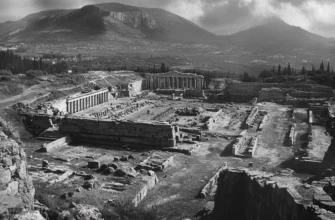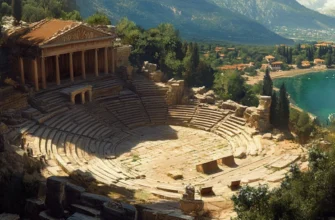Education in ancient Greece was highly developed and of great importance to the Greeks. The education system included preschool, elementary, secondary, and higher education. Teachers were important figures in Greek life and enjoyed great authority. Education was based exclusively on the humanities, such as logic, rhetoric, mathematics, and philosophy. Greek education has had a strong influence on modern teaching practices, especially in the humanities.
The education system
The education system in Ancient Greece was highly developed and consisted of several levels. The first level, preschool education, included learning to read, write, and the basics of music. Elementary education included mathematics, grammar, geography, and physical training. Secondary education involved in-depth study of the humanities, such as rhetoric and philosophy. The highest level of education was higher education, which included training for various professions, including doctors, philosophers, and politicians. Education in Greece was only available to men from wealthy families who had sufficient means to pay for tuition and support teachers.
Preschool education
Preschool education in the Ancient Greek education system included teaching children the basics of music, reading, and writing. Children usually studied at home until they were mature enough to continue their education at the next level. Preschool education also included physical training, as physical strength and skills were important parts of Greek life. Teachers in preschool classes were usually relatives of the children or hired for the job. In addition, preschool education could be provided within the local community or at temples, where children had the opportunity to learn the basics of morality and religion.
Elementary education
Elementary education in Ancient Greece included the study of grammar, mathematics, music, and geography. Education was usually provided until the age of 14. Teachers used memorization techniques, in which students repeated knowledge over and over again to commit it to memory. In some cities, there were state schools where students could study for free. In most cases, however, education cost money, and only children from wealthy families had the opportunity to receive higher education. The teaching of mathematics was particularly important, as Greek science was based on geometry and arithmetic.
Secondary education
Secondary education in Ancient Greece was focused on preparing students for higher education. Secondary school lasted until the age of 18-20 and included in-depth study of grammar, logic, rhetoric, and philosophy. Students also studied music, dance, sports, and gymnastics, as physical training was an important part of Greek culture. Students could be admitted to schools based on selection or teacher recommendation. Teachers in secondary schools were better paid and more highly qualified than teachers in elementary schools. Secondary school students had the opportunity to participate in the Olympic Games, which were important events in Greek life.
Higher education
Higher education in Ancient Greece was only available to a limited group of people, usually men from wealthy families. The most famous university in Ancient Greece was the University of Athens, where teaching was conducted in specialized departments such as philosophy, mathematics, medicine, and others. Students usually attended lectures by famous scholars such as Plato, Aristotle, and Socrates. The main purpose of higher education was to train leaders and civil servants. In many cases, university graduates held high positions in the government or became famous philosophers, writers, or intellectuals of their time.
The role of teachers and students
In Ancient Greece, teachers had great authority and were considered wise men who passed on their knowledge to their students. Teachers not only taught subjects, but also educated their students in the spirit of Greek morality and ethics, teaching them rhetoric and argumentation. Students had to follow strict rules of conduct and discipline, otherwise they could be expelled from school.
Students also had a great responsibility for their own education and upbringing. They had to be prepared for admission to school and follow the rules of conduct and discipline at school. Students were allowed to ask questions to teachers and participate in discussions, but they also had to be prepared to answer questions and defend their positions. The successful education and upbringing of students depended on the interaction between teachers and students and on their joint work and perseverance.
The influence of Greek education on modern teaching practices
Greek education has been an important source of inspiration for many modern teaching practices. They contributed to the development of ideas about education, teaching methods, and discipline, which have become key elements of today’s teaching systems.
One example is the approach introduced in Greek education, which consisted of using dialogue and discussion as a means of teaching and education. This method is still used in modern pedagogy to stimulate students to think critically and develop their ability to express their own thoughts.
Greek education also focused on the development of the student’s personality and talents, which inspired the development of modern methods of personality-oriented pedagogy, which prioritizes the individual needs and abilities of each student.
Thus, Greek education has made a significant contribution to modern pedagogy, providing not only methodological solutions but also important principles and values.
Conclusions
Education in ancient Greece was extremely important for society, promoting the development of thinking, talents, personal growth, and the formation of moral values. The education system consisted of preschool, elementary, secondary, and higher education, which ensured the complete formation of the personality.
The main goal of Greek education was to form citizens who could be useful to a society that was becoming increasingly complex and developed. On this path, dedication to knowledge and discipline played an important role and became integral elements of Greek culture.
The education system of ancient Greece has been a source of inspiration for many pedagogical practices that exist today. Teaching methods introduced in Greek education, such as dialogue and discussion, influenced the development of modern teaching and education methods. Also, the focus on personal development and talent development inspired the development of person-centered pedagogy.
Thus, Greek education had a great influence on society and modern pedagogy and is an important part of cultural heritage that inspires new ideas and development.








